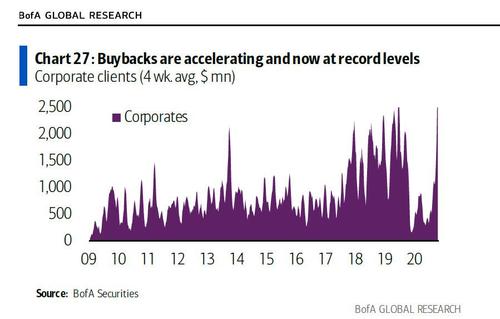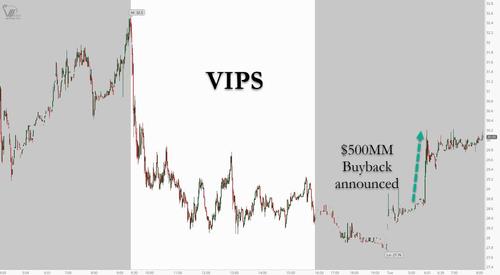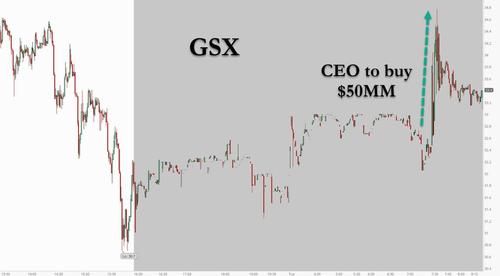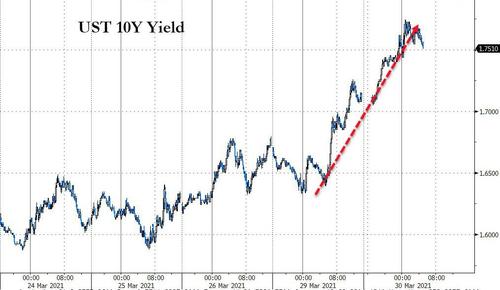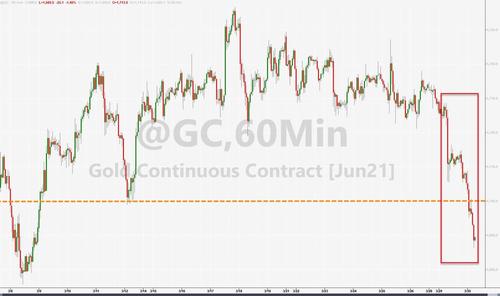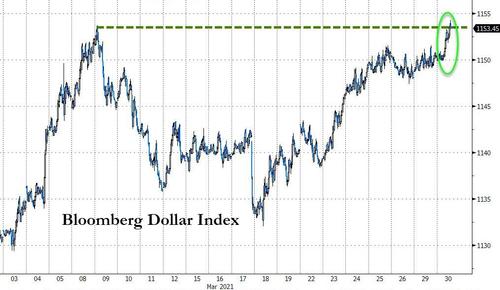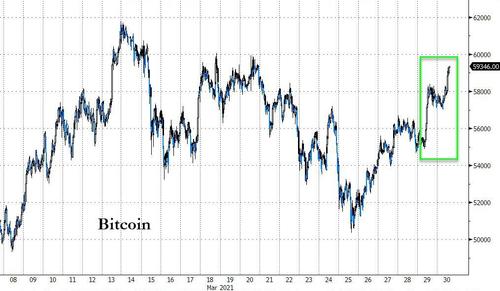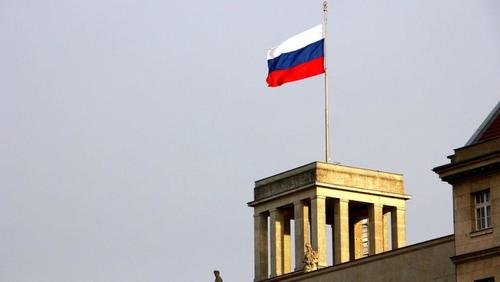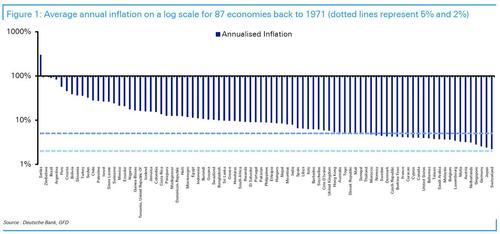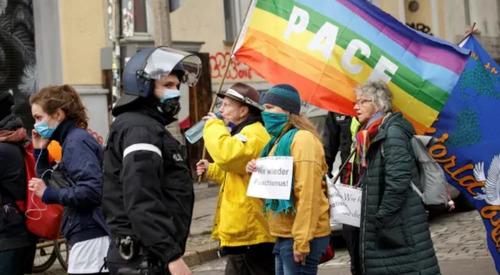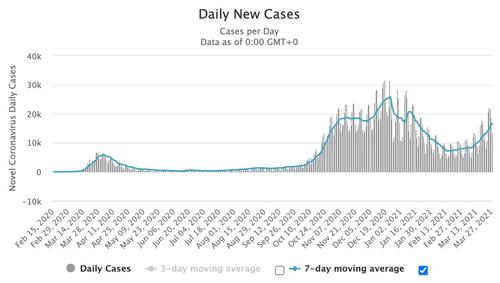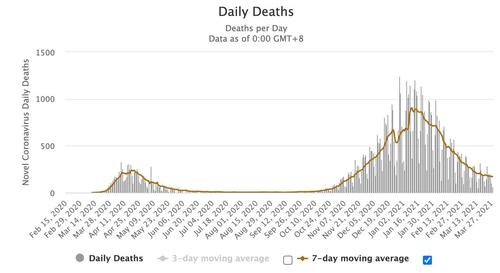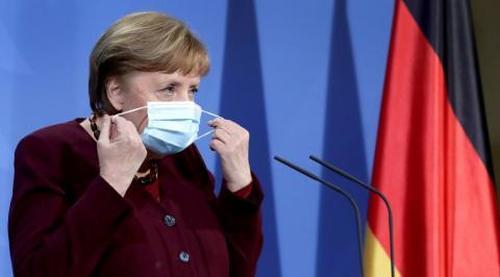US index future slumped on Tuesday as traders continued to fret over fallout from the implosion of Archegos (especially after Morgan Stanley said it was not done selling residual blocks) and as Treasury yields soared to the highest since Jan 2020.
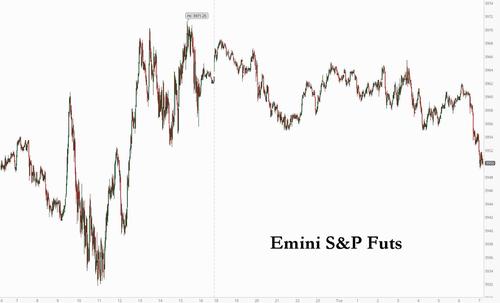
Emini S&P futures were down 13 points or -0.3% to 3,946, with ViacomCBS shares rising 2.6% premarket; Discovery Inc. and the American Depositary Receipts of Chinese companies linked to the Archegos block trades also posted gains. Tesla fell after a report Xiaomi Corp. plans to invest $15 billion to make electric cars. Industrial stocks and banks such as JPMorgan, Morgan Stanley and Boeing added between 0.9% and 1.4%. American Airlines rose 1.2% after an upgrade from Jefferies. The carrier expects to put most of its fleet back in service in the second quarter on signs of a travel rebound.
Nasdaq 100 futures slipped 0.7% as the FAAMG stocks dropped between 0.6% and 0.8% premarket, pressured by the latest reflation scare which pushed the 10Y as high as 1.77%. The Nasdaq -which is still about 7% below its all-time closing high, while bets on a speedy economic recovery driven by vaccine distributions and unprecedented stimulus has helped the S&P 500 and the Dow notch record closing highs last week – is set for its first monthly loss since November as rosy economic projections lifted demand for undervalued banks, energy, materials and industrial stocks.
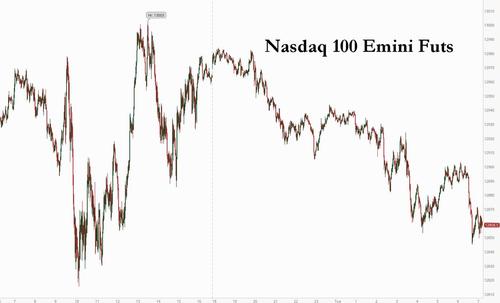
Traders are also focused on 10Y yields which rose as high as 1.77%, and even though there was no specific catalyst for the sharp move higher bonds have been weak ahead of President Joe Biden’s U.S. infrastructure plan details due Wednesday. Breaks of key levels appear to have fueled stops outs of long positions with 5-year yields edging above 0.90% during the Asian session. prompting a block sale in the sector and a similar pattern of follow through selling
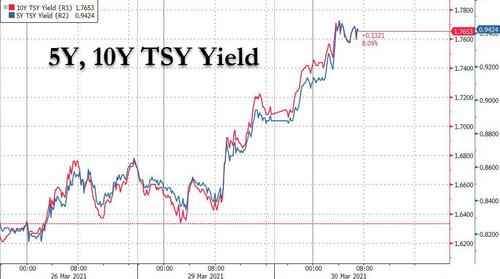
“U.S. Treasuries care more about inflation than Archegos fallout, and they continue their fall,” Steen Jakobsen, chief investment officer at Saxo Bank in Hellerup, Denmark, wrote in a note. “Biden’s speech might be catalyst for a deeper selloff.”
In an address Wednesday in Pittsburgh, Biden will detail a mass expansion of government spending aimed to reducing inequality and strengthening infrastructure. A revamp of the tax code is also part of the plan and is already proving divisive among economists and lawmakers. The reflation trade was also boosted by the latest vaccine news after the U.S. reached a record three-day stretch of 10 million shots over the weekend, according to the Bloomberg Vaccine Tracker, and plans to offer inoculations to 90% of adults. Investor sentiment is still closely tied to the pace of the global vaccine rollout, said Citigroup equity derivative solutions director Elizabeth Tian. “Investors will also be watching the number of COVID cases as rises in Western Europe and the Philippines see the return of renewed restrictions, while vaccination attempts threaten to stall amidst supply constraints and vaccine nationalism,” Tian said. “While restrictions are increased in Europe, the UK will be relaxing stay-at-home rules.”
Meanwhile, Nomura shares were down a further 1.1% Tuesday after dropping as much as 16% on Monday, when it revealed it might take a $2 billion loss from the hedge fund fallout. “From a market perspective, with contagion looking limited … despite the news flow of further forced liquidations and prime brokerage losses, this looks at this stage to be a positioning-driven sell-off in U.S. futures and various single stock names,” said Eleanor Creagh, market strategist at Saxo Bank. Creagh added that further forced deleveraging was still a risk if prime brokers tighten margin requirements.
MSCI’s All Country World Index, which tracks stocks across 49 countries, traded flat.
In Europe, the Stoxx 600 Index advanced 0.4%, supported by gains in banks and automakers. Britain’s FTSE 100 was up 0.2%, Germany’s DAX 0.6%, Italy’s FTSE MIB rose 0.3%, and France’s CAC 40 rose 0.5%. The banks’ subgroup index rose 1.7%, followed by a 1.5% jump in automakers’ shares.
Earlier in the session, MSCI’s broadest index of Asia-Pacific shares outside Japan was 0.6% higher, after a two-day gain, with losses in Japan and some Southeast Asian markets offsetting a rally in China and South Korea. Mainland China’s CSI300 index rose 1%. Hong Kong’s Hang Seng Index gained 1.2% to reach 28,668, driven up by a rebound in the city’s tech stock index. That index has been under pressure from concern over the Chinese government’s move to increase regulation of tech companies. Japan’s Topix declined 0.8%, halting a three-day rally, as a majority of stocks on the index traded without rights to their next dividends. Nomura Holdings extended losses after plunging by a record on Monday, when the brokerage said it may have incurred a “significant” loss arising from transactions with a U.S. client. Equity gauges in Indonesia and the Philippines were the biggest losers in the region. Sector-wise, financials were the biggest drag on the MSCI Asia Pacific Index. Meanwhile, stocks in China, Hong Kong and South Korea and India rallied, with the CSI 300 Index set for third day of gains. The gauge has been anchored at a key support level as traders awaited further clarity from corporate earnings. Shares of Taiwan-based Appier Group, which offers artificial intelligence-based software, rose 19% in their trading debut on the Tokyo Stock Exchange
Japan’s Topix fell, halting a three-day rally, as a majority of stocks on the index traded without rights to their next dividends. Telecommunication firms and trading companies were the heaviest drags on the Topix as over 1,500 of the gauge’s more than 2,100 firms went ex-dividend. The Nikkei 225 Stock Average gained for a fourth consecutive day even as 188 of its 225 members went ex-dividend. “It was the unique situation with the supply demand that impacted markets today, with shares trading ex-dividend,” said Masahiro Ichikawa, chief market strategist at Sumitomo Mitsui DS Asset Management Co. “The market seems to have calmed somewhat now, but finance-related shares are a bit weak.” Nomura Holdings fell for a second day after announcing Monday that it may have incurred a “significant” loss arising from transactions with a U.S. client. The loss is related to the unwinding of trades by Bill Hwang’s Archegos Capital Management, according to people familiar with the matter. “In the global market of excess liquidity, we can’t be sure that Archegos is the only fund that took such one-sided positions in investing,” said Hideyuki Ishiguro, a senior strategist at Daiwa Securities Co. in Tokyo. “This kind of uncertainty will serve as a drag on the market.”
In rates, 10-Y Treasury yields were 1.76%, rising as much as 6.6bp to 1.774%, the highest since January 2020; into the selloff 5-year yields breached 0.90% for the first time since March 2020. The five-year rate rose as high as 0.95%, a 13-month high, followed by a block sale in the notes. Belly yields remain higher by 5bp-7bp with focal points include U.S. President Biden’s plan for an infrastructure spending package, with details expected Wednesday.Intermediate-led selloff cheapened 2s7s30s fly by 7bp on the day to 25.3bp, widest since 2018. In Europe, Bunds and gilts both trade slightly cheaper vs Treasuries; 10,000 bund contracts were sold via block trade, worth around $1.8m/DV01
As a reminder, quarter-end rebalancing remains a focus, is expected to favor buying of Treasuries. Bank of America sees $41BN inflows for Treasuries while Wells Fargo expects U.S. corporate- defined pensions moving a “historically large” $19b into bonds.
In FX, the Bloomberg Dollar Spot Index rose to its highest level in three weeks and the euro fell to a low of $1.1733 in early London trading; the Bund yield curve bear-steepened in line with developments in Treasuries. The dollar sliced through the key psychological 110 mark versus the yen as elevated U.S. Treasury yields and the improving global economic outlook continue to boost the greenback, and options suggest that the strength is here to stay. The Australian and New Zealand dollars were steady against the rising dollar, with risk appetite supported by a quickening U.S. vaccine rollout and expectations for a continued recovery in China’s economy. The Canadian dollar and the Norwegian krone also held up well against a backdrop of rising oil prices and a new round of OPEC+ talks later this week where the producers believe their defiantly cautious approach is paying off. China’s yuan consolidated after slumping to the weakest level in almost four months on Monday. The USD/CNY rises as much as 0.2% to 6.5799 before erasing most of the earlier gain; USD/CNH stays in a narrow a range of 6.5683-6.5836. The PBOC weakened the daily reference rate by 0.34% to 6.5641 vsaverage estimate of 6.5643 in a Bloomberg survey; forecasts ranged from 6.5610 to 6.5685.
Bitcoin gained about 2% after Reuters reported that PayPal Holdings Inc is set to announce that it has started allowing U.S. consumers to use their cryptocurrency holdings to pay at millions of its online merchants globally.
In commodities, oil declined for the first time in three days as the Suez Canal opened up after being blocked for days by a grounded supercarrier and as attention turned to an OPEC+ meeting this week, where the extension of supply curbs may be on the table amid new coronavirus pandemic lockdowns. Gold extended a drop, falling out out of a range held since early March as President Joe Biden prepared to unveil big spending plans after announcing major progress on rolling out vaccines
Looking at the day ahead, the data releases from Europe include the Euro Area’s final consumer confidence reading for March and the preliminary German CPI reading for March. Over in the US, there’s the FHFA house price index for January and the Conference Board’s consumer confidence reading for March. Otherwise, central bank speakers include Fed Vice Chair Quarles and New York Fed President Williams, along with the ECB’s Centeno.
Market Snapshot
- S&P 500 futures little changed at 3,958.75
- SXXP Index up 0.5% to 429.83
- German 10Y yield up 5 bps to -0.27%
- Euro down 0.2% to $1.1742
- MXAP little changed at 204.97
- MXAPJ up 0.4% to 680.14
- Nikkei up 0.2% to 29,432.70
- Topix down 0.8% to 1,977.86
- Hang Seng Index up 0.8% to 28,577.50
- Shanghai Composite up 0.6% to 3,456.68
- Sensex up 2.3% to 50,144.47
- Australia S&P/ASX 200 down 0.9% to 6,738.45
- Kospi up 1.1% to 3,070.00
- Brent futures down 0.6% to $64.59/bbl
- Gold spot down 0.7% to $1,699.44
- U.S. Dollar Index up 0.1% to 93.07
Top Overnight News from Bloomberg
- Chinese sovereign bonds will have the sixth-largest weighting in FTSE Russell’s flagship World Government Bond Index, though global investors have three times longer than they expected to grow their holdings to that level
- Germany increased planned bond sales in the second quarter by 2.5 billion euros ($2.9 billion), as the government ramps up borrowing to help offset the impact of the coronavirus pandemic
- Turkish President Recep Tayyip Erdogan appointed Mustafa Duman, formerly an executive director at Morgan Stanley in Turkey, to the central bank’s interest-rate setting committee, as the shake-up at the monetary authority deepens
- A European Commission sentiment index increased to 101.0, exceeding all estimates in a Bloomberg survey. Sentiment rose across all sectors of the economy and particularly strongly in Germany, the region’s largest member. Employment expectations jumped
- Wall Street banks grappling with the implosion of Bill Hwang’sinvestment firm spent Monday briefing U.S. regulators as Washington starts to dig into one of the biggest fund blowups in years
- More than half of the population of England was estimated to have Covid-19 antibodies in the week ended March 14, illustrating the impact of the U.K.’s vaccination program
A quick look at global markets courtesy of Newsquawk
Asia-Pac stocks just about shrugged off the early indecision following the negative bias stateside where the DJIA posted fresh record levels but most indices declined as sentiment was dampened due to the fallout from the USD 20bln Archegos liquidation and with a rise in yields, as well as ongoing COVID-19 concerns adding to the glum mood. ASX 200 (-0.9%) and Nikkei 225 (+0.2%) swung between gains and losses with the former eventually dragged lower by weakness across commodity-related sectors and reports of further virus cases in Queensland where there is an ongoing 3-day lockdown in the state capital, while the Japanese benchmark lacked firm direction as Nomura shares extended on the prior day’s largest decline on record, triggered by the losses related to the recent Archegos margin call but with losses in the index cushioned by currency weakness and mostly better than expected Unemployment and Retail Sales data. Hang Seng (+0.8%) and Shanghai Comp. (+0.6%) were initially choppy amid a deluge of earnings releases and heading into quarter-end, although Chinese markets eventually gained as participants digested the FTSE Russell announcement for the inclusion of Chinese government bonds to its FTSE World Government Bond Index at a weight of 5.25% which will occur over 36 months from the effective date of 29th October 2021 which HSBC estimated could result to around USD 130bln of inflows to Chinese bonds. Finally, 10yr JGBs were lacklustre amid the spillover selling from USTs and with demand also sapped amid the 2yr JGB auction later which resulted into a lower b/c despite a decline in accepted prices.
Top Asian News
- Buffett-Backed BYD’s Profit Surges 162% on Electric-Car Boom
- Toyota Defies Global Semiconductor Crunch as Output Rises
- Pakistan Starts Marketing Dollar Bond After Resuming IMF Bailout
- Hyundai Motor to Halt Production on Chips, Parts Shortage
European equities (Eurostoxx 50 +0.2%) have kicked the session off on a firmer footing once again with little in the way of fresh macro newsflow driving the move. One of the key themes for the session thus far has been continued rises in global bond yields with the US 10yr yield taking out its recent 1.7540% peak to breach 1.77% to the upside. In the US, this has placed some pressure on the rate-sensitive e-mini Nasdaq 100 (-0.4%), which lags its stateside counterparts; e-mini S&P U/C and e-mini Russell +0.5%. In the more cyclically-focused European indices, banking names have led the charge higher with the Stoxx 600 Banking Index up by around 2% amid the favourable yield environment. Notable gains have also been observed in Basic Resources, Insurance, Autos and Travel & Leisure. Market participants will be eyeing the sustainability of the latter in lieu of the ongoing third wave of COVID-19 in the Eurozone which has subsequently prompted UK press to speculate that “next week’s review of international travel will likely conclude that it’s too soon to say when the borders can be reopened”, according to The Sun. To the downside, Health Care names reside in negative territory with defensive names shunned in early trade. In terms of stock specifics, Volkswagen (+3.1%) is a notable gainer in the auto sector as market participants continue to weigh up the Co.’s future in the EV space with recent reports suggesting a potential name change for its American unit to Voltswagen of America. In the financial sector Credit Suisse (-1.7%) was initially a beneficiary of the broader impulses in banking names, however, the Co. continues to remain in the news cycle given its exposure to the recent Archegos liquidation – and that initial strength has since reversed. Accordingly, one of the Co.’s. largest shareholders has requested that Chairman, Urs Rohner, receives a pay cut after a series of mistakes while speculation continues to mount around the magnitude of its exposure. In the tobacco space, a “good start to the year” was not enough to prevent Imperial Brands (-1.7%) from delving into the red following its latest trading update with the sector also hampered by comments from the UK Environment Ministry suggesting it could force tobacco names to pay for the clearing up of cigarette butts.
Top European News
- H&M Should Lay Low Until China Anger Blows Over, EU Chamber Says
- Germany Increases Bond Sales by $2.9 Billion in Second Quarter
- PPF Signals Deal Pipeline Intact After Billionaire Owner’s Death
- Deliveroo Expected to Price London IPO at Bottom of Range
In FX, the Dollar index has finally attained 93.000+ status and is still bid between 92.882-93.176 parameters alongside US Treasury yields that have risen to new cycle highs along certain parts of the curve, but the DXY may have derived sufficient momentum to breach the psychological mark regardless given bullish month end factors, like the strong rebalancing buy signal vs the Yen, or further depreciation in the Euro on 3rd wave pandemic concerns. Indeed, Usd/Jpy has made a clean break above 110.00 to test 110.30 and Eur/Usd down through 1.1750 towards 1.1730 at one stage, leaving little in the way of support from a technical perspective before 110.50 and 1.1700 respectively. Ahead, US consumer confidence and a couple of Fed speakers, as Quarles and Williams orate as neutrals and current FOMC voters.
- CHF – Not much protection for the Franc via big beat vs consensus in the Swiss KOF indicator as Usd/Chf hovers above 0.9400 and Eur/Chf straddles 1.1050 with very tight confines awaiting official reserves and ZEW investor sentiment on Wednesday.
- NZD/AUD/GBP/CAD – All managing to hang on to the Greenback’s coattails, with the Kiwi and Aussie benefiting from only isolated and contained COVID-19 outbreaks and a sharp rise in bond yields overnight, while the Pound is also gleaning underlying impetus from the UK’s advanced position on vaccinations that is keeping the roadmap to lifting lockdown intact (for now at least). Nzd/Usd is just holding above 0.7000 as Aud/Usd pivots 0.7650 and Aud/Nzd rotates around 1.0900, while Cable is holding close to 1.3750 and Usd/Cad is keeping tabs on 1.2600 ahead of Canadian average earnings data.
- SCANDI/EM/PM – Little independent direction for the Norwegian Krona via choppy crude prices or not as weak as expected retail sales, but Eur/Nok is hovering around 10.0500 and Nok/Sek is extending towards 1.0200 as Eur/Sek eyes 10.2500 following somewhat mixed Swedish sentiment indicators and in advance of scheduled comments from Riksbank Governor Ingves. Elsewhere, a sea of red for EM currencies and precious metals, but headline-grabbing declines for the Try following more retaliation against the CBRT for tightening the reins by Turkish President Erdogan who has now fired the Deputy Governor. Meanwhile, Xau has fallen below Usd 1700/oz as Gold folds amidst the Usd and UST squeeze.
In commodities, WTI and Brent front month futures opened the session on a softer footing but in a contained range, however, losses have since accelerated with the complex residing just off session lows. Downward pressure was seen in the wake of traffic resuming through the Suez Canal, however, attention may now begin to switch elsewhere. On this, eyes are expected to turn to the OPEC+ meeting later in the week, where participants will discuss maintaining output cuts. Due to the fragile COVID situation and fresh lockdowns, sources state that Saudi Arabia will support extending oil cuts through June as well as continuing its own 1mln BPD cut. Moreover, this would be in a bid to boost oil prices given the current uncertainty surrounding the virus and the economic outlook. As such, the market expectation is skewed towards an extension of cuts. The May WTI contract trades marginally above USD 61.00/bbl (vs high USD 62.27/bbl) whilst its Brent counterpart trades mid USD 64.00/bbl (vs high USD 65.41/bbl). Spot gold and spot silver are both seeing downside and are continuing to face downward pressure in correlation with Dollar strength and rising US yields. With the DXY reaching a 4-month high and yields a 14-month peak, gold notched its lowest price in more than three weeks as it slipped below USD 1,700/oz in early morning trade. At the time of writing, spot gold trades at USD 1,697/oz (vs high USD 1,714/oz) and silver trades just shy of USD 24.50/oz (vs high USD 24.76/oz). Onto base metals, LME copper saw overnight gains because of strong consumer demand in China, albeit gains have since been trimmed with the metal residing around 0.7% down for the session.
US Event Calendar
- 9am: Jan. S&P CS Composite-20 YoY, est. 11.20%, prior 10.10%; 20 City MoM SA, est. 1.20%, prior 1.25%
- 9am: Jan. FHFA House Price Index MoM, est. 1.2%, prior 1.1%
- 10am: March Conf. Board Consumer Confidence, est. 96.9, prior 91.3; Expectations, prior 90.8; Present Situation, prior 92.0
DB’s Henry Allen concludes the overnight wrap
Following much anticipation ahead of the open as to the consequences of the block trades, the broader market impact proved to be relatively contained yesterday, with the S&P 500 down just -0.09% from its all-time high on Friday. Nevertheless, some of the names at the centre of the trades came under severe pressure, and bank stocks were the worst-performing of the 24 sectors in the S&P, as they shed -2.05% on the day in response, and all 18 members of that industry group moved lower on the day. The most severe impact was actually experienced by non-US banks however, with Nomura (-16.33%) seeing its largest daily move lower ever and Credit Suisse (-13.83%) experiencing its worst performance in over a year, as both warned that they faced sizeable losses in the wake of the selling. Nomura flagged a potential $2 billion loss, while Credit Suisse said that the loss “could be highly significant and material to our first quarter results”. In terms of the other affected companies, ViacomCBS fell a further -4.86%, and has lost more than half its value since a week ago, while Discovery fell another -1.47% – though this was relatively benign after last week’s -45.77% decline.
In terms of the latest overnight, Archegos Capital Management who were behind the forced liquidation finally released a statement on recent events, saying that “All plans are being discussed as Mr. Hwang and the team determine the best path forward.” Meanwhile Bloomberg reported that a Nomura executive had said they were in the process of assessing the cause of the loss, though it was hard to tell when the company would be able to determine the size. Nomura has fallen a further -1.13% lower in Asia this morning after its record fall the previous day, though as in the US, the broader impact seems to be contained at time of writing, with indices including the Nikkei (+0.14%), Shanghai Comp (+0.59%), Hang Seng (+1.17%) and Kospi (+1.14%) all posting gains. Meanwhile futures on the S&P 500 (-0.05%) are also only indicating a small decline at the open.
Elsewhere overnight, the Turkish Lira weakened another -0.77% against the US Dollar after President Erdogan removed central bank Deputy Governor Murat Cetinkaya and replaced him with Mustafa Duman, an ex-Morgan Stanley executive director in Turkey. That follows the removal of the Governor the weekend before last that led to one of the biggest selloffs in Turkish assets for years. Otherwise, data out of Japan has surprised somewhat to the upside, with the jobless rate in February staying at 2.9% (vs. 3.0% expected), and retail sales up +3.1% month-on-month (vs. +0.8% expected).
Back to yesterday, and the other big development was that the Ever Given ship in the Suez Canal was finally freed after nearly a week in place, thus allowing normal traffic to resume. Oil prices fell back in response to the news, though by the end of the session they’d actually moved higher, with Brent Crude (+0.63%) and WTI (+0.97%) both rising on the day. The consequences are still likely to stick around for a while however, with the Suez Canal Authority saying that it could take multiple days to clear the backlog of hundreds of ships that’s built up in recent days. Energy shares in the US fell back regardless of the slight uptick in oil prices with the S&P 500 energy sector down -1.26%, but the STOXX 600 Energy sector rose +0.65%.
More broadly in markets, investors took the block trades story in their stride on the whole as mentioned, with most equity indices seeing little change on the day. In the US, the Dow Jones (+0.30%) hit an all-time high, though the NASDAQ (-0.60%) saw a bigger pullback as tech stocks continued their underperformance. Over in Europe, the STOXX 600 (+0.16%) eked out a small gain to hit a post-pandemic high, and the DAX (+0.47%) advanced to an all-time high, though the STOXX Banks (-1.29%) lost ground in line with bank stocks elsewhere.
Over in the US, increasing details were coming through ahead of tomorrow’s major infrastructure speech by President Biden, with the Washington Post reporting that it would centre on ideas to repair physical infrastructure, invest in R&D and support clean energy, while other measures such as on childcare and healthcare would be unveiled next month. It also said that the plan could have “as much as $4 trillion in new spending and more than $3 trillion in tax increases”, though they’re not expected to make the new expansion of the child tax credit permanent. Meanwhile another notable development yesterday was that multiple outlets including Politico reported that Senate Majority Leader Schumer was prepared to pass not just a second but also a third reconciliation bill this year. For reference, reconciliation is the process where legislation is passed through the Senate that only requires a simple majority, rather than the 60 votes needed to override a filibuster. Normally, this can only be used once per fiscal year, but the fact that there wasn’t a budget resolution passed last year meant that they carried one over to pass the American Rescue Plan that was signed earlier this month. And while ordinarily that would leave just one further attempt remaining, it’s being reported that Schumer thinks that a provision in the 1974 Congressional Budget Act could allow a third attempt, which would offer the Democrats a potential opportunity to pass another bill this fiscal year without needing to rely on Republican votes.
Against this backdrop yields on 10yr US Treasuries rose +3.2bps to 1.708%, which is their highest closing level since the pandemic began, and they’re up a further +3.4bps this morning, to 1.742%, putting them just shy of the recent intraday high of 1.753% a couple of weeks back. Higher real rates (+2.5bps) drove the bulk of the move yesterday, though inflation expectations also reached fresh highs, with 10yr breakevens up +0.6bps to 2.37%, their highest level since 2013. Furthermore, the 2s10s yield curve steepened +3.0bps to 156bps, a level not seen since 2015. Europe similarly saw a move higher in rates, with yields on 10yr bunds (+2.8bps), OATs (+3.3bps) and gilts (+3.1bps) all rising over the session.
On the pandemic, there weren’t a great deal of major developments yesterday, though concern continued to rise in multiple regions as the number of global cases has been steadily rising for over a month now. Though Europe is at the forefront of a potential new wave, the head of the CDC in the US warned that they also risked facing a fresh wave of cases, with the trajectory looking “similar” to what happened in the EU a few weeks ago, as she said that “I just worry that we’ll see the surges we saw over the summer and over the winter again.” The data from John Hopkins shows that although cases fell consistently in the US from their high in early January to early March, since then there’s been a plateauing of the numbers. We did get some more positive news from a CDC report however yesterday, which showed that the Pfizer and Moderna vaccines were 90% effective at preventing infections after two doses, regardless of symptom status. This offers a sliver of optimism for the US where 29% of the population has now received at least one shot, with 16% fully vaccinated. New York was the latest state to announce plans to expand eligibility to all adults in the coming days, joining a majority of states now offering the jab as widely as possible. And President Biden announced that 90% of the US adult population should now be eligible by April 19. The US is on pace to be administering 3 million shots per day, with supply increasing as more Johnson & Johnson production comes online.
Wrapping up with yesterday’s data, the Dallas Fed’s manufacturing activity index for March, which rose to a two-and-a-half year high of 28.9 (vs. 16.8 expected). Notably there were more signs of inflationary pressures building, with the finished goods prices index up to 32.2, which is the highest since 2008. Meanwhile in the UK, mortgage approvals fell more than expected to 87.7k in February (vs. 95.0k expected), which was their lowest level since last August.
To the day ahead now, and the data releases from Europe include the Euro Area’s final consumer confidence reading for March and the preliminary German CPI reading for March. Over in the US, there’s the FHFA house price index for January and the Conference Board’s consumer confidence reading for March. Otherwise, central bank speakers include Fed Vice Chair Quarles and New York Fed President Williams, along with the ECB’s Centeno.
